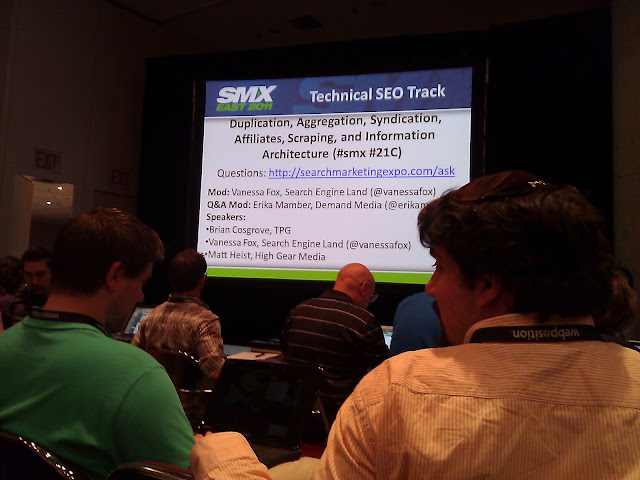- It’s a Google’s world. We just rank in it. Or not.
- The 4 Cs Of SEO Success: Code, Content, Connections (links) & Conversation (social).
- Link Earning instead of Link Building
- Is link building dead? Great question asked by audience member. Audience & @dannysullivan say no!
- Social media is the new link building
- Reminder to all: .Co is fine, .Com is always good, & .Co.CC was the pure evil that got obliterated.
- You rock as a brand if the CPC for your brand is pennies on the dollar and you have 8 sitelinks.
- Is there a way to know when you have arrived as brand? - Yes, when you have a Google ad rep
- If people leave the site because their info need was fulfilled it's not a bounce
- "If you have no Panda problems, don't fix things"
- Too much syndicated content dilutes the value of the original content.
- THE CHALLENGES - Feeds from suppliers, Too many categories, Items are too similar
- Writing unique content is the cost-of-entry for SEO
- TOOLSET FOR SUCCESS - SEO Strategy, Keyword Mapping, Content Strategy,Work flow,Style Guide,Content Calendar, Creative Brief
- If you have too many sites and the content is distributed and thin then it is not good
- Have fewer but content rich sites with clear audience segments
- Content resonates in search AND social.
- With the evolution of Social (joining Search from a distribution perspective), premium content that is authoritative AND fresh will flourish
- Semantic (Structured Code) The semantic web is a “man made woven web of data” that facilitates machines to understand the semantics .
- TYPES OF STRUCTURED DATA FOR SEO - Rich Snippets, Rel=Author, Schema.org
- TYPES OF RICH SNIPPETS Reviews , People, Products, Businesses & Organizations, Recipes, Events, Music
- REL=AUTHOR RESTRICTIONS - Doesn’t support multiple author blogs , Only works on same site (i.e. won’t work yet for syndicated content), Only works on self-hosted sites
- SCHEMA.ORG - Created by Google, Bing and Yahoo! - Launched June 2, 2011 - Way for engines to easily identify types of content
- Some Problems - Schema is a “New” mark-up, Standards not in place, Not a big ROI right now
- But, it is the right time to implement as these are in all probability to be given importance by the search engine. Hence, when they will become a priority the site which already has these snippets and microformats in place will have a probability to be ahead .
- Best Time to Implement is when - Moving to a new CMS, Launching new templates, Launching a new site, Site redesign, Down dev cycles
- Some of our related blog posts on this topic are:
- Look at things like… Network, Web access logs, HTTP response codes, HTTP response headers and talk to the network admins/developers
- Checking load balancing
- Checking server latency
- Checking network latency
- Checking for duplicate sites
- Web access log analysis
- Monitor and check crawling inefficiency
- Identify Duplicate Content Problems
- Have a proper error handling page
- Make the site Cache friendly
Presented By: · Duane Forrester, Bing· Vanessa Fox, Search Engine Land· Tiffany Oberoi, Google· Myron Rosmarin, Rosmarin Search Marketing, Inc.
- Stop Running Reports. Start Providing Analysis.
- Reporting is Pulling data and plugging it into a spreadsheet - Analysis is: Making sense of data, providing insights for improvement and providing explanations
- The Webmaster Tools are valuable sources of “Diagnostic Data”that enable you to provide a more thorough analysis of problems your site may have so you can take action toward improvement
- Numbers without something to compare to don’t mean much.
- Everything is Relative
- Pull data at appropriate time intervals
God, grant me the serenity to accept
the things I cannot change,
Courage to change the things I can,
And wisdom to know the difference.
Day 3 Sept. 15th 2011
The conference on the third day was only for half a day till 3:00 p.m
Link Building: Why You're Doing It Wrong
Presented By
· Jenny Halasz, Nine by Blue· Byrne Hobart, Digital Due Diligence
· Rae Hoffman-Dolan, Sugarrae SEO Firm
Link building is important. But,
- Try to build natural links. Go for quality over quantity
- Guest Post = Your Inbound Link Value
- When you write guest posts see that you put few links and make the post as informative as possible
- When you write a guest post or any blog post on any general topic try to correlate it with your niche industry so that it has a probability of going viral in both the fields
- Check for existing writer guidelines before contacting
- Send personal and individual emails
- Use names whenever possible
- Prove you’re not a bot
- Ask a genuine question
- Never assume they know who you are
- Include a potential topic idea and example post
- DO NOT MENTION LINKS (but do mention edits)
Presented By: · Vanessa Fox, Search Engine Land· Max Thomas, Thunder SEO· Marty Weintraub, aimClear
- Rankings as a metric is easy to understand hence the popularity but, Only looking at rankings does not give an idea about indexing and crawling
- Measure the impact of changes made on the site
- Monitor Errors Over time alongwith Google Page Not found errors
- Cluster by category impressions, clicks, CTR, Avg. Position
- Organic impressions = Technical SEO + Sematic SEO
- The Title tags the main tag responsible for high CTR
- If you have high rankings and If your CTR is bad then your title tags are probably bad.
- People don’t pay for what they don’t understand.
- Empower Your Primary Client
- Make it easy for them to convey easily what’s happening Don’t wait for them to tell you. Figure it out. Ask questions.
- What’s working
- What’s not
- Where to focus resources
- Connection of SEO/SMM to sales (or conversions)
- How to explain to key decision makers so they understand











